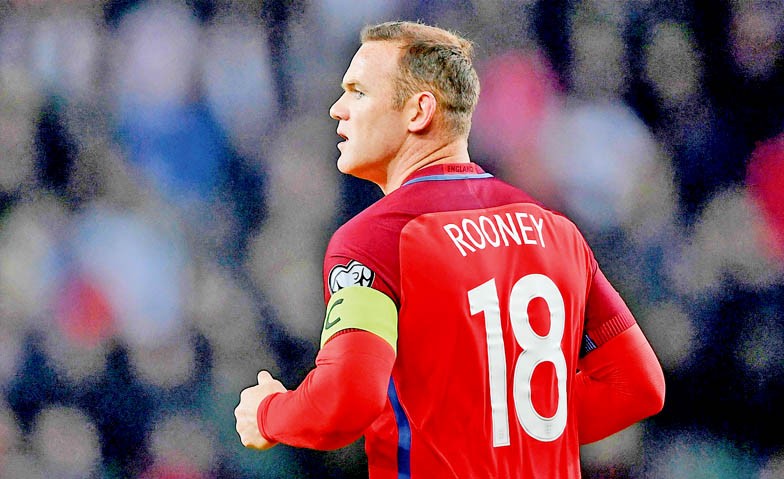

For English football fans, this seems to have turned into a woeful trend over the decades. Gary Lineker, Alan Shearer, David Beckham, Michael Owen, Frank Lampard, Steven Gerrard - dozens of big names came and went, shattering dozens of big expectations that many attached to their names. While some might argue to the contrary in his case, recent retiree, Wayne Rooney, also finds his name on the list of huge disappointments as far as international football is concerned.
Once the golden boy of English football, Wayne Rooney rose to fame on the club football stage with that goal against Arsenal in 2002, at the age of just 16. After spending two more seasons at his boyhood club of Everton, he made the big move to heavyweights Manchester United in 2004 for 25.6 million pounds. Despite starting off his Manchester United career with a hat-trick, and ending it as the club’s highest goal scorer, Rooney’s time in Manchester was largely spent being overshadowed by other, more reliable goal scorers starting with Ruud van Nistelrooy, Cristiano Ronaldo and then for a brief stint Robin van Persie, before both Rooney and United traced a downward spiral in unison.
True, by then Rooney had already seen most of his desires fulfilled with the Red Devils: five Premier League titles and one Champions League winners’ medal are only six among the sixteen top finishes Rooney made with what is called England’s most successful club. This, coupled with his being the club’s highest ever goal scorer, makes for a very glorious career on paper. Indeed, when it comes to winning silverware and scoring goals on the club level, very few people have had a better career than Rooney.
However, having said that, how many Premier League viewers would credit Wayne Rooney with being there for United in the most crucial of times or turning key games around with his goal scoring or charismatic leadership skills - this despite having served as the club’s captain for nearly three seasons? Despite his one Players’ Player of the Year Award and five Premier League Player of the Month awards, which Manchester United supporter would rank Wayne Rooney above the likes of van Nistelrooy, Ronaldo and van Persie - all roughly his contemporaries - in significance in any given season? Significance, mind you, not ability.
Few would argue that it was his lack of mettle and intelligent presence - not raw brute force - that saw the club’s highest goal scorer of all time being relegated to the bench under the club’s current manager, Jose Mourinho, after having two different stints on the bench under Sir Alex Ferguson that nearly saw Rooney move to Manchester City. Fewer still would argue that it was his descent through the ranks under the new manager, coupled with his troubled and patchy goal scoring in recent times, that led Wayne Rooney to part ways with the club where he spent thirteen very fruitful years, to return to his boyhood club of Everton, where he has found good form once again.
Indeed, it was shortly after returning to the Merseyside that Rooney decided to hang up the boots on the international stage. Does the decision come as a surprise? Both yes, and no.
Despite its very different outlook, Wayne Rooney’s international career was not excessively different from his club career, apart from the silverware he managed to win. In fact, in hindsight, his international career was all that his club career with Manchester United was, sans the silverware.
Much like his time at Manchester United, Rooney managed to become the highest ever goal scorer for the Three Lions in the last active year with them, had several Man of the Match awards and goal scoring sprees, including hat-tricks; he was made the captain of both teams in 2014, both of his careers were punctuated by disciplinary issues and a substantial number of yellow and red cards, and hung up the boots for each soon after gaining the top slot in the goal scoring table.
The only thing missing, as already mentioned, was the silverware. But to most fans of the English football team, this was the most important statistic - or so it should be.
But how would one define Rooney’s international career from the ‘boy wonder’ that single-handledly looked like winning Euro 2004 for England to the national side’s captain that had to be forcibly accommodated into the Euro 2016 squad? In between the two lie the habitual knockout stage exits, even the odd failure to qualify for the tournament altogether (Euro 2008) and a first round departure (World Cup 2014).
To average Joes, Wayne Rooney’s international football career was akin to the role of the knight in shining armour in medieval tradition. English football fans like their fairytales very much, and there is little logic that would mar their illusion of the brilliance of the 16-year-old starlet who made it big in the world of football, broke records, won captaincy armbands, and scored all the hat-tricks there are in the world. Does it matter to them that this starlet managed not to help his country make a single major semifinal - let alone win any silverware - in the thirteen years he served them?
The weight of that responsibility has clearly been taken off his shoulders - as has been the case with the rest of the underachieving passer-outs to date.
But in Rooney’s retirement England should bid adieu to their ‘superstars’ and start laying the foundation of a team, that simply has to be bigger than the individual(s) that might headline it, year in, year out.